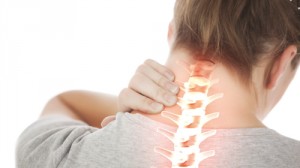Watch Your Back
How to stop poor posture creating problems for you and your children down the road.
By Melanie Rogers, Chiropractic at Active Family Chiropractic. If your posture is slumped with your shoulders rolled forward, your head will follow, also going forward. This can cause extra strain on your spine and tension on your spinal cord which could lead to headaches, neck, arm and back ache, difficulty concentrating, sitting still and poor sleep just to list a few symptoms. As Chiropractors, we work to reduce the effects these strains have on the spine to keep you moving as well as you can and symptom free. But why is this important? We are leading increasingly sedentary lifestyles from prolonged sitting and use of technology, causing a general trend of slumping, forward stooped posture and “text-neck”, especially in children. As a result, parents are seeing the need to take positive action with their children to promote better posture and back health as well as developing good habits for adulthood. The good news is that a few simple steps can help reduce the effects of poor posture on your spine, improving your overall back health:
Get moving
- The fitter children are, the more their backs can withstand periods of sitting still. Try weekend family walks and encourage cycling or walking instead of chauffeuring them around!
- Good sensible footwear can be a big help. I recommend soft-soled shoes that are supportive and have a good grip.
Computer Sense
- Using a laptop or tablet away from a desk really encourages poor posture, so it’s best to limit time spent in this way. It’s so much better to sit at a desk - sitting with arms relaxed and resting on the desk when typing will give some much needed support. The top of the screen should be level with the eyebrows, you can put the monitor on a book or ream of paper to achieve this. The desk chair should be tilted slightly forward, allowing for the knees to be lower than the hips. Feet should always be flat on the floor. Another option is to consider an adjustable standing desk. Standing desk benefits are numerous.
- Don’t sit still for too long. Children should be encouraged to take a break every 20 minutes or so and stretch their arms, shrug their shoulders and move their fingers around - this helps to keep the muscles more relaxed.
Sleeping
- Mattresses do wear out and stop giving the support they did when new. Most mattresses will need replacing after 7-10 years.
- When buying a mattress, take your child with you to try them out. You want to make sure that their spine is parallel to the mattress and not sagging (mattress too soft) or bowing (mattress too hard). Pay attention to their pillow too, as this is key to maintaining the neutral spine position.
Finally, lead by example! Maintaining good posture and promoting good back health is something that everyone should be doing, adults and children alike. If parents make it a priority, it’s easier for their children to see the relevance.
For more information about chiropractic and how it can help, speak to Melanie Rogers at Active Family Chiropractic on 01869 722053 or www.activefamilychiropractic.co.uk or visit the British Chiropractic Association website at www.chiropractic-uk.co.uk
